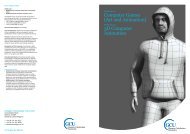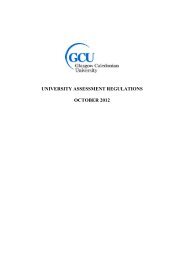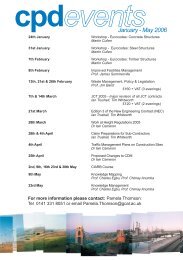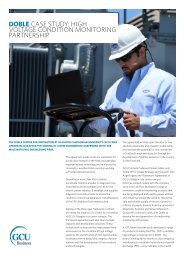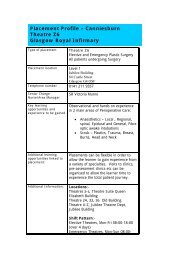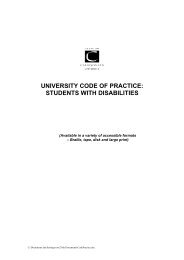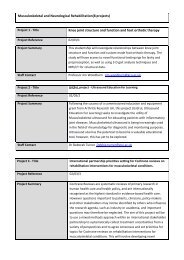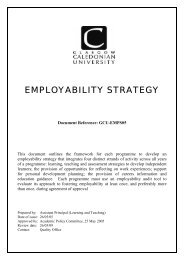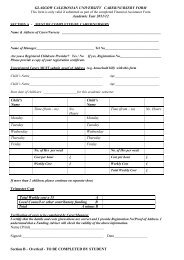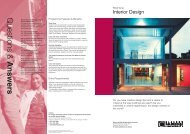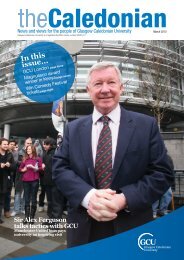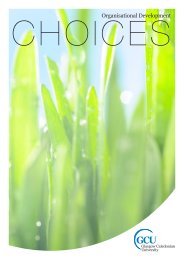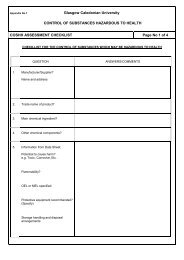Biopta - Glasgow Caledonian University
Biopta - Glasgow Caledonian University
Biopta - Glasgow Caledonian University
You also want an ePaper? Increase the reach of your titles
YUMPU automatically turns print PDFs into web optimized ePapers that Google loves.
S c h o o l o f H e a l t h a n d L i f e S c i e n c e s<br />
APPLIED KNOWLEDGE EXCHANGE<br />
CASE STUDY: HUMAN TISSUE RESEARCH FOR PHARMACEUTICAL DEVELOPMENT<br />
<strong>Biopta</strong><br />
<strong>Biopta</strong> is a Contract Research<br />
Organisation specialising in the use<br />
of human tissues for the prediction<br />
of drug efficacy and safety during<br />
non-clinical drug development.<br />
A spin-out company from <strong>Glasgow</strong><br />
<strong>Caledonian</strong> <strong>University</strong>, <strong>Biopta</strong> was set<br />
up by Dr David Bunton and Professor<br />
Chris Hillier in 2002 with the intent of<br />
developing services and technology<br />
which could reduce the 90% failure rate<br />
of drugs in clinical trials.<br />
The company has won numerous awards<br />
for innovation for its patented technology,<br />
including a Scottish Enterprise Proof of<br />
Concept Award, a regional John Logie<br />
Baird Award and a Scottish Executive<br />
SMART Award.<br />
Historically, relatively little human<br />
tissue-based research has been<br />
conducted using fresh human tissues<br />
because of the difficulties in sourcing<br />
and working with such tissues. However,<br />
the pharmaceutical industry has<br />
recognised that the differences between<br />
species and poorly predictive in vitro<br />
methods have contributed to a high<br />
failure rate of new drugs.<br />
<strong>Biopta</strong>’s aim is to make fresh,<br />
functional human tissue assays a routine<br />
part of the drug discovery process; in<br />
2005 <strong>Biopta</strong> became the first company<br />
testing fresh human tissues to become<br />
members of the Good Laboratory<br />
Practice programme.<br />
Scotland’s First Minister Alex Salmond<br />
has congratulated <strong>Biopta</strong> on being an<br />
example of Scotland’s great innovation<br />
traditions, adding that the company<br />
counts eight of the top 10 pharmaceutical<br />
companies in the world<br />
among its clients.<br />
<strong>Biopta</strong> has conducted drug development<br />
projects for clients in areas as diverse as<br />
asthma, diabetes, hypertension, cancer<br />
and migraine. To maintain its growth<br />
<strong>Biopta</strong> aims to stay at the forefront of<br />
human tissue research and has created<br />
a dedicated internal R&D team, which is<br />
creating new assays in inflammation,<br />
absorption and cardiac safety.<br />
If a client has specific requirements<br />
utilising a particular tissue within a target<br />
therapeutic area, <strong>Biopta</strong> can create and<br />
validate a bespoke assay to meet their<br />
needs. Human pharmacology studies<br />
bridge the gap between animal in vivo<br />
data and the clinic and offer invaluable<br />
human data much earlier in the drug<br />
development process, helping to reduce<br />
the risk of late stage failures.<br />
<strong>Biopta</strong>’s core expertise is utilising fresh<br />
isolated ex vivo human tissues and<br />
measuring a functional response such as<br />
an unwanted constriction or dilation.<br />
<strong>Biopta</strong>’s human tissue assays, with full<br />
GLP compliance, provide invaluable<br />
pre-clinical supporting data in humans.<br />
<strong>Biopta</strong> can also provide a fully<br />
outsourced human tissue research<br />
service to its clients; branded as<br />
TissueConnections, this service offers<br />
<strong>Biopta</strong>’s expertise in the sourcing,<br />
provision and use of human tissues to its<br />
clients in the pharmaceutical industry. By<br />
procuring human tissues for its clients<br />
and dealing with all aspects of such<br />
research projects including material<br />
Dr David Bunton, <strong>Biopta</strong> Ltd<br />
T: 0141 330 3831 E: davidbunton@biopta.com<br />
William Campbell, School of Health and Life Sciences,<br />
<strong>Glasgow</strong> <strong>Caledonian</strong> <strong>University</strong>, Cowcaddens Road, <strong>Glasgow</strong>, G4 0BA<br />
T: 0141 331 3267 E: william.campbell@gcu.ac.uk<br />
Further information:<br />
www.gcu.ac.uk/hls<br />
www.biopta.com
APPLIED KNOWLEDGE EXCHANGE<br />
CASE STUDY: HUMAN TISSUE RESEARCH FOR PHARMACEUTICAL DEVELOPMENT<br />
transfer agreements, legal compliance and<br />
project management <strong>Biopta</strong> is able to offer<br />
a truly integrated solution to companies<br />
wishing to access the benefits of human<br />
tissue research.<br />
<strong>Biopta</strong> has recently developed a number<br />
of novel assays including investigations<br />
into inflammatory processes using healthy<br />
and inflamed human tissues. Tissues<br />
available include the full human<br />
gastrointestinal tract, skin, lung and blood<br />
vessels. Inflammation affects many tissues<br />
and is increasingly being revealed as a<br />
causative factor in a number of chronic<br />
diseases. <strong>Biopta</strong> is able to predict drug<br />
effects such as inflammatory activity or<br />
drug absorption in the stomach, small<br />
intestine or large intestine, providing<br />
valuable information on safety or efficacy.<br />
Current in vitro methods for the prediction<br />
of gut permeability are often unsatisfactory<br />
as they are inaccurate when used to<br />
predict the absorption of compounds that<br />
are actively absorbed by the gut or<br />
compounds that are poorly absorbed.<br />
<strong>Biopta</strong> also has expertise in the study of<br />
both cardiac and vascular tissues. Human<br />
cardiovascular tissues can be used to<br />
determine the efficacy of treatments for<br />
heart failure, angina or hypertension,<br />
but are most commonly used to detect<br />
adverse effects.<br />
Dr David Bunton, co-founder and<br />
CEO of <strong>Biopta</strong>, is an expert in vascular<br />
pharmacology who, after graduating<br />
from the <strong>University</strong> of <strong>Glasgow</strong>,<br />
undertook a Research Assistant<br />
position sponsored by the charity<br />
Chest, Heart and Stroke, Scotland.<br />
The success of this period of research<br />
resulted in David taking up a PhD at<br />
<strong>Glasgow</strong> <strong>Caledonian</strong> <strong>University</strong> and a<br />
Lectureship in Physiology and<br />
Pharmacology. David was also a<br />
consultant to the Diabetes Education and<br />
Training Unit at <strong>Glasgow</strong> <strong>Caledonian</strong>.<br />
David has numerous publications in<br />
respiratory and vascular pharmacology<br />
including recently published reviews on<br />
the use of human tissues in drug discovery<br />
(Drug Discovery Today, May 2009; ATLA,<br />
2009). He is also a member of the British<br />
Pharmacological Society.<br />
<strong>Biopta</strong> also has<br />
expertise in the study<br />
of both cardiac and<br />
vascular tissues.<br />
S c h o o l o f H e a l t h a n d L i f e S c i e n c e s<br />
Dr David Bunton, <strong>Biopta</strong> Ltd<br />
T: 0141 330 3831 E: davidbunton@biopta.com<br />
William Campbell, School of Health and Life Sciences,<br />
<strong>Glasgow</strong> <strong>Caledonian</strong> <strong>University</strong>, Cowcaddens Road, <strong>Glasgow</strong>, G4 0BA<br />
T: 0141 331 3267 E: william.campbell@gcu.ac.uk<br />
Further information:<br />
www.gcu.ac.uk/hls<br />
www.biopta.com



